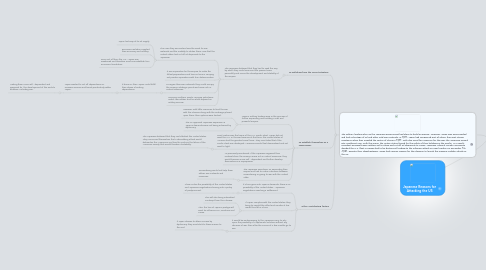
1. The military leaders who ran the Japanese government had plans to build an empire. However, Japan was overcrowded and had a shortage of oil and other vital war materials. In 1931, Japan had conquered part of China, then met strong resistance when they invaded the center of China in 1937. WIth dire need for resources for this war, the Japanese moved into Southeast Asia. WIth this move, the Unites States feared for the safety of their holdings in the Pacific. As a result, President Rossevelt gave military aid to China and cut off oil shipments to Japan. Japanese Admiral Isoroku Yamamoto decided the U.S. fleet in Hawaii had to be destroyed, leading to the infamous attack on Pearl Harbor on December 7th ,1941. Despite their disadvantages, Japan had various reasons for this decision to launch the massive, sudden attack on the US.
1.1. To withdraw from the curent situation.
1.1.1. The Japanese believed that they had to seek the way by which they could surmount the present crisis peacefully and insure the development and stability of the Empire.
1.1.1.1. The crisis they encounterd was the need for war materials and the inability to obtain them, now that the United States had cut off oil shipments to the Japanese.
1.1.1.1.1. Japan lost 90% of its oil supply
1.1.1.1.2. Economic isolation crippled their economy and military.
1.1.1.1.3. Since cut off from the U.S., Japan was weakened and therefore must now establish firm economic foundation.
1.1.1.2. It was imperative for the Empire to make the fullest preparations and lose no time in carrying out positive operations with firm determination.
1.1.1.3. To regain their war materials, they could occupy the enemy's strategic points and areas rich in natural resources.
1.1.1.3.1. If done so, then Japan could fulfill their desire of ending dependance.
1.1.1.4. Securing southern points, recquire petroleum, nickel, raw rubber, and tin which depend on military success
1.2. To establish themselves as a superpower.
1.2.1. Japan's military leaders were in the process of further expanding and building a vast and powerful empire.
1.2.1.1. However, with little resources to fund the war with the Chinese along with the embargo placed upon them, their options were limited.
1.2.1.2. The US opposed Japanese expansion & Japan's demands were not being achieved by diplomacy.
1.2.2. Pearl Harbor was the home of the U.S. Pacific Fleet. Japan did not want the U.S. in the war because at that time, the United States of America had the greatest Naval force. They concluded that if the Pacific Fleet was destroyed, Americans would feel demoralized and not want to fight.
1.2.2.1. The Japanese believed that they could defeat the United States. They convinced themselves that a devastating attack would dishearten the Americans and lead to cracks in the fabric of the American society that would threaten its stability.
1.2.3. As previously mentioned, if the Japanese regained their materials from the enemy's areas rich in natural resources, they would become more self - dependent and further develop themselves as a superpower.
1.2.4. The Japanese were keen on expanding their empire and had to make a decision between surrendering or going to war with the United State
1.2.4.1. Surrendering would not help them obtain war materials and resources.
1.3. Other contributing factors
1.3.1. If China gives into Japan's demands, there is no possibility of the United States - Japanese negotiations reaching a settlement.
1.3.1.1. There is also the possibility of the United States and Japanese negotiations turning into a policy of postponment.
1.3.2. If Japan complies with the United States, they bring to naught the effort and sacrifice it has made thus far in China.
1.3.2.1. This will also bring intensified contempt from the Chinese.
1.3.2.2. Also, the loss of Japan's pretige will exert its influence on Manchuria and Korea.
1.3.3. It would be embarrassing to the Japanese Navy to rely upon the possbility of a diplomatic solution without any decision of war, then after the course of a few months go to war.
1.3.3.1. If Japan desires to attain success by diplomacy, they must stick to these means to the end.
